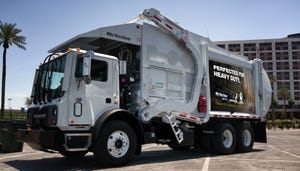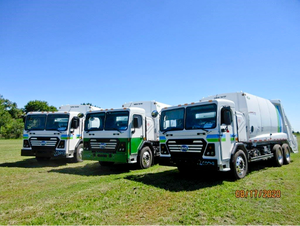recycling: L.A. Shares Its Resources
July 1, 1997
Lynn Merrill
Reuse through Material Exchange Pro-grams is one of the most promising areas of the recycling field and, unfortunately, one of the most neglected.
Here's how they work: A contractor is faced with demolishing an older building which has architectural components that may be used for restoring a historical building. Or, perhaps there are large quantities of construction grade wood that may be salvaged for other construction.
Instead of destroying these materials through the normal demolition process, the contractor salvages and then donates them to a material ex-change. Generally, these exchanges are operated by not-for-profit agencies which make the materials available to others for either a very low cost or, in some cases, no cost.
The benefits of such a deal include:
* the contractor may receive a tax deduction equivalent to the donated materials' value;
* the material exchange obtains a ready supply of free material;
* a low income family or a not-for-profit organization secures the materials needed to repair a house; and
* society gets the wastes efficiently re-used.
One materials reuse program in Los Angeles, called "L.A. SHARES," ob-tains excess, unwanted or unused materials from companies in the area. The agency trucks travel at no charge and by appointment, pick up the donated materials and bring them back to warehouses in Griffith Park.
The materials are then put on display in a retail-like atmosphere. "We make the materials available free to more than 50,000 not-for-profits and schools in the county of Los Angeles," says Bert Ball, L.A. SHARES' executive director.
"Groups register with us, come shopping three days a week, Wed-nesday through Friday, and take what they want for free," he continues. "They have one responsibility: Everything is marked with the donors' name, and [the recipients] have a responsibility to write the donor a thank you letter and send us a copy."
"We're now the largest single donor to the school system, the Alcohol and Drug Recovery community, the senior citizens' community, the after-school latch key program, the arts community and soon, by helping give away the personal property on the Long Beach Naval base, we'll become the largest single donor to the homeless community too," he says.
The program began as part of the City of Los Angeles' Cultural Affairs Department's effort to provide materials to artists, but the obvious benefit to the community quickly was realized. Eventually, the program formed into it's own not-for-profit organization, complete with a board of directors and the ability to raise funds.
"That allowed the city to give us some money, the building and to pay for our local telephone and mailing privileges," says Ball. "The whole idea behind L.A. SHARES is to create new partnerships." For example, Toyota provides trucks and the city and the Port of Los Angeles provide the warehouses.
The program maintains a sophisticated inventory process which allows L.A. SHARES to quickly match donated materials with those in need. While the program has concentrated primarily on hard goods, such as desks and office furniture, it also handles some materials salvaged from construction and demolition projects, a resource it plans to expand in the future.
"We're looking at it now, and we're going to be heading toward building a full-blown reuse building materials program," reports Ball.
For more information, contact L.A. SHARES at (213) 485-1097.
You May Also Like


